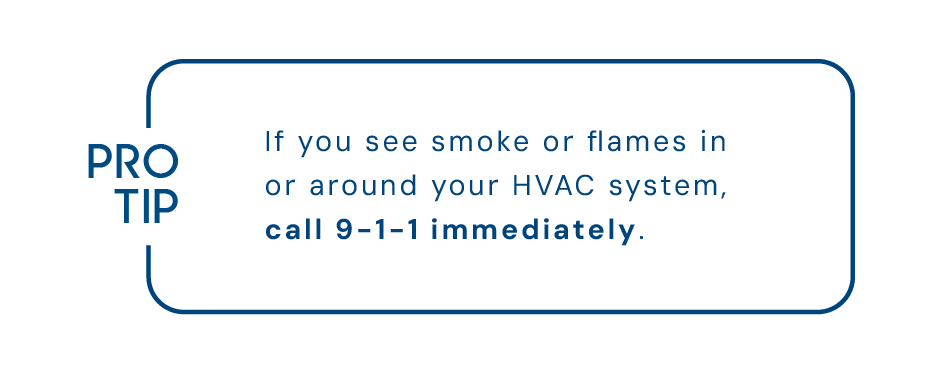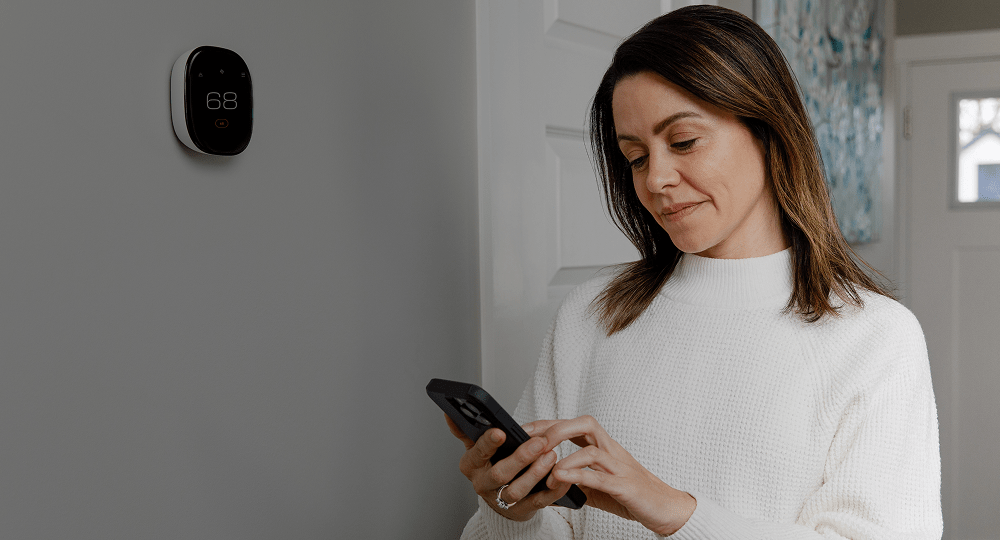How to prevent an AC emergency and what to do if your AC breaks.

A broken air conditioner (AC) during the summer isn’t just annoying — it can be life-threatening. If your air conditioner, whether that’s a central air conditioner, heat pump, mini-split or any element of your cooling system, breaks, TVA EnergyRight is here to help you know what to do next. Plus, we’ll give you some simple tips for keeping your home cool until your air conditioning system is back on its feet and fully functioning again.
And if you do find yourself in need of new heating and cooling equipment, our home energy rebates and convenient on-bill financing option can help.
What is an AC emergency?
An AC emergency can look, sound and feel like different things. You might be experiencing an AC emergency if your AC:
- Stops working and the outdoor temperature exceeds 90° F.
- Produces a burning smell.
- Leaks water inside the house.
- Forms ice in the summer on the outdoor unit and around connecting lines.
- Experiences electrical issues that cause your breaker to trip.
- Produces any loud or especially unusual sounds.
If you know your AC makes an odd-but-predictable-to-you noise when it kicks on, then it’s probably not an emergency. Should you get it checked out? Yes! But you probably don’t need a same-day appointment with an HVAC pro. If it’s the middle of July, 98° F outside and your AC completely breaks down, that is an emergency. People’s safety could be at risk if you don’t take immediate action.
In an emergency situation, consider turning the system “Off” and set the fan to “On” instead of “Auto.”
It’s probably worth noting that the national refrigerant standards are changing in 2025, and the new standards may increase the cost of replacing your system. If you’ve been thinking about replacing your AC, you may want to consider doing it before January 1, 2025. Don’t forget to familiarize yourself with our HVAC system rebates before you take the plunge!
Who is most at risk when your AC breaks?
Don’t take chances with the health of anyone living in your household. Even an indoor temperature of 80° F can be considered excessive heat for:
- Babies, infants and young children.
- The elderly.
- People who are immuno-compromised or chronically ill.
- Pets.
Avoid dangerous consequences for at-risk people and animals by preparing a heat wave preparedness plan now (more on that in just a minute).
5 steps to take if your AC breaks.
If you experience an air conditioner emergency like any of the ones we just outlined or are living with anyone whose health could be in danger, here’s what to do:
- Check the thermostat. It’s possible the thermostat was accidentally turned off or set to heat instead of cool.
- Check the circuit breaker. A power surge or nearby lightning strike may have temporarily cut off your power supply. You may be able to restore power to your system just by flipping a switch back on. If your HVAC system continues to go out, though, don’t continue to mess with your circuit breaker. It could cause additional damage.
- Turn off power to the AC unit. If it’s not the thermostat and not the breaker, then just go ahead and cut off power to your HVAC system at the breaker box. If you don’t know where your breaker box is, can’t find the appropriate switch inside or don’t feel comfortable with the task, skip this step and go straight to step four.

- Contact an HVAC system contractor/repair person ASAP. If your area is in the middle of a heat wave, you can bet that every HVAC pro in town is fielding calls left and right. Get on their appointment list as soon as you can. Even though it’s an emergency, don’t just pick any contractor you can find. That could leave you vulnerable to bad actors who don’t have the best interest of your home and budget in mind. Instead, search our Quality Contractor Network for free. We only list TVA-vetted HVAC pros who have been trained to meet our project quality standards.
- Move any heat-sensitive residents to a cooler location. You may be able to personally wait it out for an HVAC technician to arrive, but prioritize moving anyone in your household who is especially vulnerable to excessive heat to another cooler location.
While these are the immediate steps to take if you’re experiencing an AC emergency, there are more things you can do to stay as comfortable as possible while you wait for a system repair or replacement.
How to stay cool while you wait for AC repair or replacement.
Unfortunately, if your AC goes out in the middle of summer, even if only for an afternoon or evening, it’s going to get hot inside . . . quickly. As we just mentioned, if there are any people or pets in your home who could experience life-threatening consequences from excessive heat, get them moved as soon as possible to a cooler location. That could be someone else’s home, a hotel, or even a library, church or big box store for a few hours. Anywhere with air conditioning is better than a place with no air conditioning.

Here are some ways to keep cool(ish) if your AC is broken:
- Use fans. Fans don’t actually decrease the temperature of your home but they increase circulation, helping your body keep itself cool.
- Set ceiling fans to rotate counterclockwise. This creates a cooling downdraft.
- Put a bowl of ice in front of a fan. As the fan rotates, it will create a cooling breeze.
- Put box fans in your windows at night. This helps draw in cooler air from outside. (Yes, it might still be 80° weather, but that’ll be cooler than any 95° F temps you might be rocking inside!)
- Drink lots of water. Stay hydrated and avoid caffeinated and alcoholic beverages that can further dehydrate you.
- Skip the stove, dishwasher and dryer. Any heat-generating appliances in your home are only going to make things feel worse, so avoid using them as much as you can.
- Take a cold shower. A cold shower might feel terrible on any other day, but if your AC is out, it might just be what the doctor ordered.
- Close curtains and blinds. A surprising amount of the sun’s heat can make its way through windows, especially if they aren’t double-paned or coated in a heat-blocking film.
- Freeze water bottles. Water bottles, frozen veggies, ice packs — they can all make nice cold compresses.
- Wear loose and lightweight clothing. Aim for breathable fabrics like linen and cotton.
- Leave the house. Don’t grin and bear it if you can avoid it. Go to the mall, visit a friend’s house, go to an indoor ice skating rink, find a pool, get a hotel room for the night. And if it’s not possible to leave, check your city government or local health department’s website for transportation and accommodation resources for people without access to air conditioning during a major heat event.
How to prepare for a major heat event.
When it’s summer in the South, you know a heat wave or two (or three) is going to roll in. Hot temps, especially for an extended period of time, can really be dangerous, and not just to vulnerable populations. So, when the next round of excessive heat arrives, be ready. Here’s how to prepare:
Take the free DIY Home Energy Assessment.
Know where your home stands when it comes to your HVAC system’s energy efficiency. When you complete our free online DIY Home Energy Assessment, you’ll get an easy-to-follow report highlighting the exact steps you can take to boost your home’s energy efficiency, including HVAC system performance, and start saving money. Plus, we’ll mail you a free energy-saving kit and $10 home improvement store gift card. If you’d prefer an evaluation from a pro, you can book a Home Energy Evaluation with a TVA-certified Home Energy Advisor instead.
Find an HVAC technician before you need one.
Remember earlier when we said every HVAC technician’s phone will be ringing off the hook during a heat wave? Well, one way you can pull a little favor and inch your way to the top of the line is to already have a relationship with an HVAC pro or company. Most often, they’ll want to prioritize existing customers, continue to provide great customer service and lock in your future business.
Don’t know who to hire? Head to our Quality Contractor Network where you can search for local HVAC pros in your area for free. All Quality Contractor Network members are vetted by TVA, licensed, insured and trained to meet TVA’s project quality standards. Make sure their name and contact information is already saved in your phone.
Get an AC tune-up in the spring.
One way to form an ongoing relationship with your local HVAC company is to get regular HVAC system tune-ups: one in the spring for your cooling system and one in the fall for your heating system. Not only can this help you jump the line in an AC emergency, but tune-ups extend the life of your HVAC system and can help prevent total system breakdowns. (Don’t miss our $50 tune-up rebate for central air conditioning systems.)
Perform basic DIY weatherproofing.
There are lots of simple and inexpensive things you can do to keep outside air out of your home. Weatherproofing (or weatherization) is the process of sealing gaps and cracks in your home. Weatherization is important for a more energy efficient home and lower energy bill, and in times of extreme weather when every degree counts, you’ll be glad for the extra buffers.
Use weatherstripping and caulk around windows. Get inexpensive door sweeps to block gaps around doors. Or in a pinch, skip those options and use blankets or towels around doors and windows.
Take a peek at your attic, wall and floor insulation
Properly insulating your home results in a more comfortable and energy efficient home! Be sure to check out our rebates on new attic insulation.
Create a heat wave preparedness plan.
Now that you have some important preventive pieces in play, it’s time to create an air conditioning emergency plan. This doesn’t need to be anything fancy or expensive — it just needs to keep you safe in extreme heat if you’ve lost access to air conditioning. Here are some things to add to your prep list:
- Keep jugs of purified water on hand.
- Keep frozen ice packs and bottled water in the freezer.
- Have backup fans: handheld, window, standing.
- Determine a location where you and anyone in your household can go if it becomes unsafe to stay at home. Don’t forget about pets.
- Consult with your doctor or anyone overseeing medical care for vulnerable household members (including pets) about what to do in the event of extreme heat. Ask about indoor temperature thresholds, signs of heat-related illnesses, and where to find free local transportation and/or accommodations resources.
HVAC replacement isn’t cheap. We can help.
Just hearing the words “new HVAC system” will strike fear into the heart of most homeowners. HVAC replacements aren’t cheap, they usually come at a bad time, and they’re not something anyone really wants to spend their money on. Fortunately, not every AC emergency requires an HVAC system replacement. But when it does, we’re here to help.
If it’s time to replace your HVAC system, start by hiring a TVA-vetted contractor from our Quality Contractor Network. Not only are you going to get quality work from a trusted HVAC pro, but Quality Contractor Network members are also your key to unlocking all of our home energy rebates, including HVAC system rebates, which range from $50 to $1,500. Plus, together with your local power company, TVA EnergyRight also offers a helpful on-bill financing option. It’s $0 down, features a competitive fixed-interest rate, and the monthly payments are split up and spread across your monthly energy bills. It’s more convenient, easier to track and safer because there’s no third-party managing your loan. Don’t let an AC emergency take the fun out of summer. Instead, stay cool, stay safe and save big.





